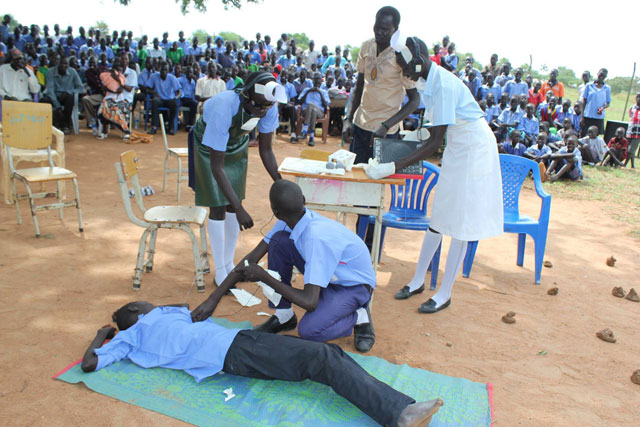World Toilet Day 2015
Today is World Toilet Day, a day in which we stop and think about the fact that one in every three people on this planet don’t have access to the most basic of human rights, a toilet.
Drop in the Bucket works with many communities and schools who have no toilets at all. When people need to go, they go out and find some nearby bushes. This attracts flies, and flies spread diseases. One of the most common and deadly is diarrhea. Diarrhea kills approximately 2,195 children every day, according to a 2010 World Health Organization and UNICEF study on child mortality. In fact, diarrhea causes more deaths than AIDS, malaria, and measles combined! One significant difference is that diarrhea is easily preventable and treatable. It has a very simple and efficient cure — soap, water, and access to a toilet.

Sanitation Education
Of course, the most effective way to combat diarrhea and other sanitation related diseases is prevention and the best way to achieve that is through education. These photos were taken yesterday by one of DROP’s teams in Torit, South Sudan. The first picture shows the school drama club putting on a play for the students and the local community. The actors are talking about the benefits of going to a health center rather than going to a local witchdoctor. On the surface, the play is simply entertaining, but it also contains messages designed to educate the audience about healthier sanitation practices.
Open Defecation
Open defecation is a huge issue in many parts of the developing world and it is a massive problem in South Sudan. It is easy to build toilets, but getting people to use them can be more complicated. The challenge lies in getting community members to understand the ramifications to their health of open defecation and poor sanitation. The open air is sunny with pleasant smells, trees, and grass all around, so asking people to go into a dark and smelly pit latrine can sometimes be a hard sell. However, once you start talking to people about what happens when flies go from human waste to the food they are about to eat, that pit latrine might start to sound a lot more enticing.
Community Led Total Sanitation
This method of education is part of a program called “community led total sanitation” or CLTS, which was started a few years ago in Bangladesh. Although there are critics who suggest that it has not been successful in every area, for Drop, it has been extremely effective. Witnessing the joyful celebrations of villagers after it was declared that they were the first ODF (open defecation free) community in Torit county, really proves just how effective this method of education can be.
A four pronged approach
Although the numbers for how many people need toilets are staggering, progress is being made. Each community that gets certified as ODF is a huge victory. Not just because of the immediate health benefits, but also for the long term amount of lives saved. Then there’s the school and work days that won’t be missed due to sickness,]. Most importantly the children who may get to live past the age of five years old with proper sanitation. Toilets are one of the first steps towards better health and brighter futures. For us at DROP, water, sanitation, gender equality and education will always go hand in hand. We believe that this four pronged approach is the most effective way to reduce poverty in rural communities. It’s never too late to change where we go!
